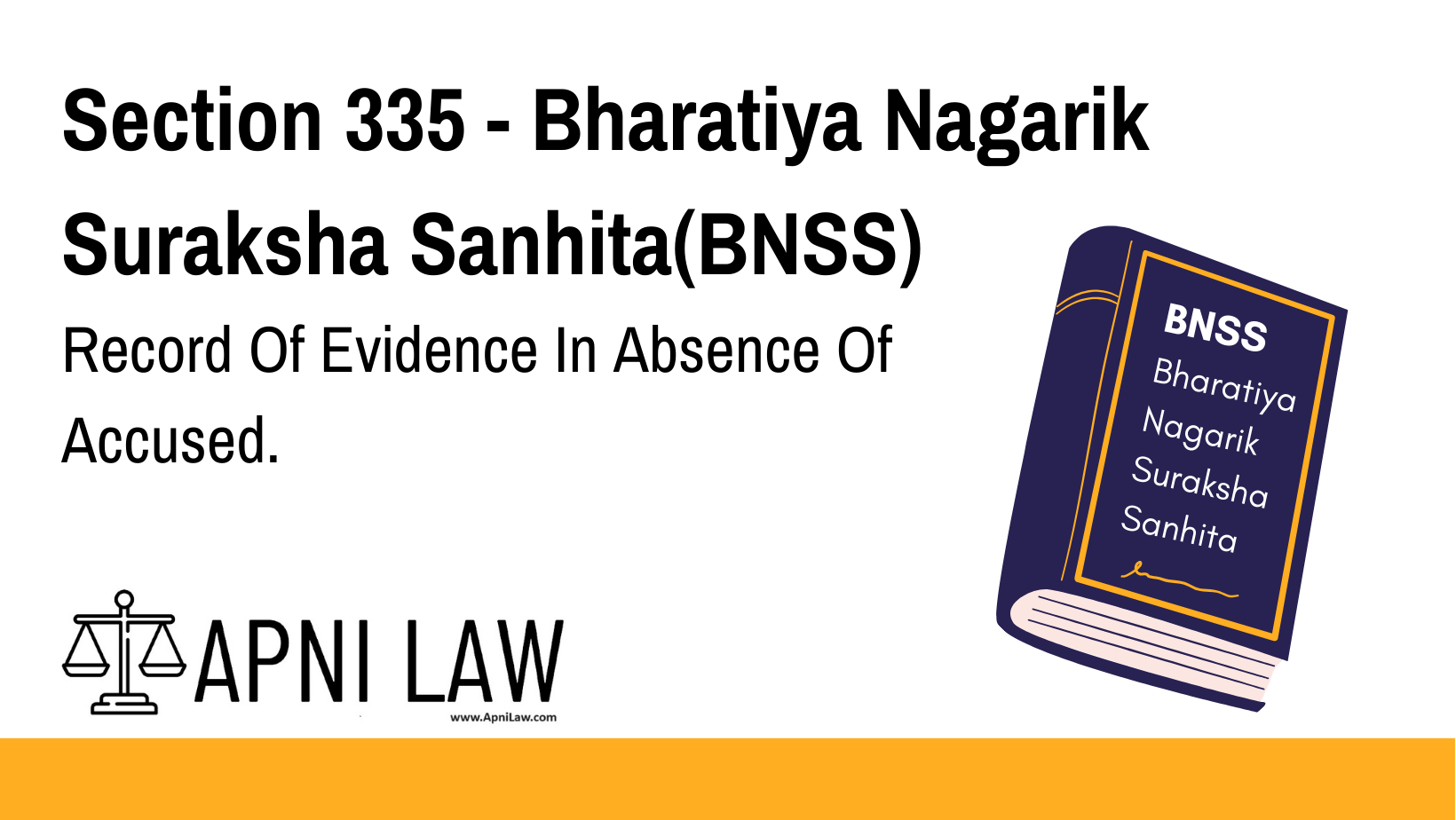Code: Section 335 BNSS
335. (1)
If it is proved that an accused person has absconded, and that there is no immediate prospect of arresting him, the Court competent to try, or commit for trial, such person for the offence complained of may, in his absence, examine the witnesses (if any) produced on behalf of the prosecution, and record their depositions. Any such deposition may, on the arrest of such person, be given in evidence against him on the inquiry into, or trial for, the offence with which he is charged, if the deponent is dead or incapable of giving evidence or cannot be found or his presence cannot be procured without an amount of delay, expense or inconvenience which, under the circumstances of the case, would be unreasonable.
(2)
If it appears that an offence punishable with death or imprisonment for life has been committed by some person or persons unknown, the High Court or the Sessions Judge may direct that any Magistrate of the first class shall hold an inquiry and examine any witnesses who can give evidence concerning the offence, and any depositions so taken may be given in evidence against any person who is subsequently accused of the offence, if the deponent is dead or incapable of giving evidence or is beyond the limits of India.
Explanation of Section 335 BNSS
Section 335 BNSS provides for the use of witness depositions in two key situations:
- Absconding Accused:
When an accused person is known to have absconded and cannot be promptly apprehended, the Court may proceed with the trial in their absence by:- Examining the prosecution’s witnesses and recording their depositions.
- Using these depositions as evidence once the accused is arrested—provided the witness (deponent) is unavailable later due to death, incapacity, or unavailability without unreasonable delay or expense.
- Offence by Unknown Person(s):
When an offence punishable by death or life imprisonment is committed by unknown persons:- The High Court or Sessions Judge may instruct a first-class Magistrate to hold an inquiry.
- Witnesses are examined, and their depositions are recorded.
- These depositions may later be used as evidence against any person subsequently accused of the offence if the original deponent is unavailable (dead, incapacitated, or residing outside India).
This section ensures that the judicial process continues smoothly even if key witnesses become unavailable, thereby preserving the evidentiary record and upholding the fairness of the trial process.
Illustrations
Example 1: Absconding Accused in a Fraud Case
- Scenario:
An individual accused of large-scale fraud absconds, and there is no immediate prospect of arrest. - Application:
The Court examines the prosecution’s witnesses and records their depositions. When the accused is eventually arrested, these depositions are admitted as evidence—even if one or more witnesses later become unavailable due to unforeseen circumstances.
Example 2: Offence by Unknown Perpetrators in a Terrorism Case
- Scenario:
A terrorist attack, punishable by life imprisonment, is committed by persons unknown. - Application:
The High Court directs a Magistrate of the first class to conduct an inquiry. Witnesses provide their depositions regarding the incident. If a key witness dies or is abroad, their deposition may still be used as evidence against any person later charged with involvement in the attack.
Common Questions and Answers on Section 335 BNSS
1. When can the Court examine witnesses in the absence of the accused?
Answer:
If the accused has absconded and there is no immediate prospect of arrest, the Court may examine witnesses in his absence and record their depositions for later use as evidence.
2. Under what conditions can these recorded depositions be used as evidence?
Answer:
The recorded depositions may be used on trial if, at the time of the accused’s subsequent arrest, the deponent is:
- Dead,
- Incapable of giving evidence, or
- Unavailable without causing unreasonable delay, expense, or inconvenience.
3. What happens in cases where the offence is committed by unknown persons?
Answer:
In cases of offences punishable by death or life imprisonment committed by unknown persons, a first-class Magistrate may be directed to hold an inquiry and record depositions, which can later be used against any person subsequently accused of the offence if the original deponent is unavailable.
4. Why is this provision important?
Answer:
This provision ensures that trials are not unduly delayed by the absence of the accused or key witnesses. It allows the judicial process to proceed while preserving vital evidence through recorded depositions, thereby ensuring the integrity and continuity of the trial.
Conclusion
Section 335 BNSS is crucial for maintaining the continuity and integrity of criminal proceedings when the accused is absconding or when key witnesses are unavailable. By allowing the recording and subsequent use of witness depositions, the provision ensures that evidence is preserved and that the trial process can move forward efficiently. This mechanism helps safeguard the rights of all parties and upholds the principle of justice even under challenging circumstances.
For more detailed legal insights and analysis, visit ApniLaw!
This article is structured to be comprehensive, clear, and optimized for legal reference and SEO. Let me know if you need further modifications or additional details!











